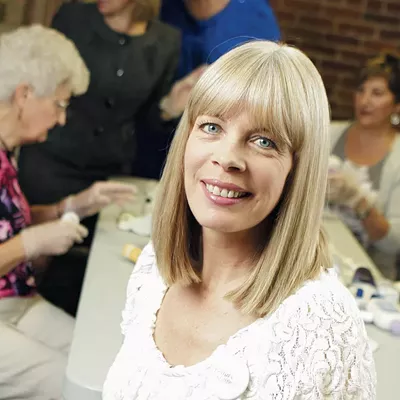Ben Stuckart is a professional asker. He has to be. Because the more people he asks for help — help in the form of checks with lots of zeros on them — the better off the entire city will be, he says.
“I have no problem anymore asking for money from people,” Stuckart says. “Because once you ask somebody for three or four things, they start to think, ‘I gotta do one.’”
Philanthropy 2010
PEIRONE PRIZE WINNERS
Taylor Weech
The 20-year-old spark plug
Ben Stuckart
The schools crusader
Emily Paulson
The one-woman
soup kitchen
Service with a Smile
Two local businesses that dish up a lot more than just a good meal
Novel Giving
Give it up for these new groups giving back to the community

Give!
Click here to start giving
Stuckart, 38, isn’t the usual volunteer-y type we’d feature here. His job is done in an office. In boardrooms. At conferences. As the executive director for Communities in Schools of Spokane County (905 W. Riverside Ave. #508; 413-1436), he comes to work in a shirt and slacks … maybe a tie. And he works day in and day out for a mission he truly believes in: By making sure fewer kids drop out of high school, he believes Spokane’s economy and quality of life will improve, which will propel the city toward a more positive future.
Everything he does revolves around a single statistic. And it’s one he wants you to think about, too. You’ve probably seen it plastered across billboards around Spokane: “One in three kids in Spokane County drop out of school.”
Stuckart works every day — through CISSC and the Children’s Investment Fund (P. O. Box 704; 413-2982) — to lower that number.
“I think it’s the best bang for our buck if we want to improve our economy,” he says. “If we want to pick up Spokane in general, we need to invest in our children.
“The better our base, the more likely we are to keep them.”
Stuckart isn’t a high school dropout. He doesn’t have kids. Stuckart willingly became the champion of fighting the one-in-three statistic because he wanted to do something good with his career, every day.
“I have a lot of hobbies and things I’m involved in, but I wanted to wake up and go to work in the morning and to be almost proud of what I do,” he says.
So he went back to school, got a master’s degree, left his job as a regional sales manager for TicketsWest, took a 25 percent pay cut and devoted himself to finding a job in the nonprofit world.
It was during his education — in the Masters of Organizational Leadership program at Gonzaga — that he had his “aha!” moment. He says the program is set up to be an “educational transformation” of sorts.
“Instead of rearranging the books on your bookshelf, it’s about trashing your bookshelf,” he says. “I’m like a test case for that theory.
“I really decided I wanted to run a nonprofit, because if you’re raising money, you’re spending it on programming or your employees. You’re not sitting there wanting to benefit shareholders.”
Degree in hand, Stuckart went after his goal of running a nonprofit. But he sent out applications for executive director jobs only.
He laughs: “It took me a long time to even get an interview.”
When he came across Communities in Schools — a national nonprofit Spokane educators and businesses were itching to start here — it was a perfect match. Stuckart, a business guy with a lot of heart, came in and built it from the ground up. He wrote the bylaws, found the office, hired the staff and figured out the best ways to connect local kids with the services they needed to keep them in school.
In His Own Words
Name: Ben Stuckart, 38
Position: Executive Director, Communities In Schools of Spokane County (CISSC); Spokane Children’s Investment Fund, Campaign Spokesman
My philosophy on life is: to give 110 percent of myself to everything I choose to do — your actions always return tenfold.
Why I give back: At a young age, my parents taught me that in the economic system we live in, a certain number of people are necessarily left behind and not taken care of. It is our moral responsibility to take care of them to the best of our ability.
I wish… that society would accept that an ounce of prevention is truly worth a pound of cure. This applies to children’s mental and physical health, education and the programs that would be financed by the Spokane Children’s Investment Fund.
I look up to: Robert Kennedy. During his transformational presidential run of 1968, RFK often asked his audience when speaking of poor children, “If you and I will not take care of them, then who?”
What he does at CISSC is never easy, he says. Stuckart wears a lot of hats: writing press releases, reviewing media campaigns, starring in commercials for the upcoming Stuff the Bus school supply drive. And, of course, asking for cash.
“In March of ’09, we were down to six grand in the bank. It took some sacrifices. We thought we were going to close,” he says. “Once we hit that [low point], it’s really picked up.”
Though he’s seen some things progress — like the Spokane City Council’s OK of the Children’s Investment Fund to go on the November ballot — Stuckart knows he’s fighting a long-standing battle.
“We were looking at our yearbooks at [my 20-year high school reunion], and it was probably one-in-three back then, too,” he says. “But back then you had this middle class of manufacturing, you could drop out and get a job at Kaiser. Now, you have to have a high school degree or a one- or two-year AA degree.”
Despite the advancements in higher education Spokane has seen recently, Stuckart worries that students limit themselves before they get the opportunity to explore their options.
“It’s become more acute. It’s not going to do us any good if we get a four-year medical school if we still have one in three kids dropping out of high school.”
 About the Peirone Prize
About the Peirone Prize
Every year, our Philanthropy Issue celebrates those organizations and individuals who answer the call — who give of themselves every day for the betterment of the community. The Peirone Prize, founded by Jeanne Peirone McGregor and Jim Peirone to honor their parents, is our family’s way of saying thanks to some of those people.
Our criteria for the prize is that you be making a difference here at a relatively young age (40-ish and younger). We accepted nominations from local leaders in the nonprofit world and came up with 48 great candidates. Philanthropy Editor Leah Sottile, Managing Editor Jacob Fries and I narrowed the batch to 15, and finally settled on our three winners, who you will meet here on Inlander.com. This year, each winner will receive $500. In coming years, as our Peirone Prize endowment grows, we’d like to add more winners or increase the size of the cash prize. (Read more about the Peirone Prize.) – TED S. McGREGOR JR.
Send your Peirone Prize 2011 nominees or thoughts on this Give Guide section to giveguide@inlander.com.
















